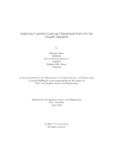| dc.contributor.advisor | Parvez, Mohammad Zavid | |
| dc.contributor.author | Afroz, Sharmin | |
| dc.contributor.author | Shimanto, Zubaed Hassan | |
| dc.contributor.author | Jahan, Ra qua Sifat | |
| dc.date.accessioned | 2019-07-14T05:00:16Z | |
| dc.date.available | 2019-07-14T05:00:16Z | |
| dc.date.copyright | 2019 | |
| dc.date.issued | 2019-04 | |
| dc.identifier.other | ID 15101041 | |
| dc.identifier.other | ID 14301057 | |
| dc.identifier.other | ID 14101123 | |
| dc.identifier.uri | http://hdl.handle.net/10361/12352 | |
| dc.description | This thesis is submitted in partial fulfillment of the requirements for the degree of Bachelor of Science in Computer Science and Engineering, 2019. | en_US |
| dc.description | Cataloged from PDF version of thesis. | |
| dc.description | Includes bibliographical references (pages 34-39). | |
| dc.description.abstract | Cognitive load and emotional states may impact for designing an assistive navigation
aid for the Visually Impaired Peoples (VIPs). In this study, electroencephalogram
(EEG) signals were captured from participants with di erent degree sight loss peoples
(DDSLPs). EEG signals were then used to measure various cognitive loads
and emotions to test the usability of an intelligent navigation aids. To support the
argument of testing the usability of a navigation aids, the complexity of the tasks
in terms of cognitive load and emotions were quanti ed considering diverse factors
by extracting features from various well established entropies when DDSLPs will
navigate unfamiliar indoor environments with di erent obstacles. Experimental results
show that classi cation accuracy for narrow space is 97.61% for cognitive load.
Moreover, the experiment achieves that 90.40% and 50.60% classi cation accuracy
for arousal and valence in the open space and stairs, respectively. | en_US |
| dc.description.statementofresponsibility | Sharmin Afroz | |
| dc.description.statementofresponsibility | Zubaed Hassan Shimanto | |
| dc.description.statementofresponsibility | Ra qua Sifat Jahan | |
| dc.format.extent | 40 pages | |
| dc.language.iso | en | en_US |
| dc.publisher | Brac University | en_US |
| dc.rights | Brac University theses are protected by copyright. They may be viewed from this source for any purpose, but reproduction or distribution in any format is prohibited without written permission. | |
| dc.subject | Cognitive load | en_US |
| dc.subject | Emotional states | en_US |
| dc.subject | EEG | en_US |
| dc.subject | Human brain | en_US |
| dc.subject | Entropy | en_US |
| dc.subject | SVM | en_US |
| dc.subject.lcsh | Machine learning | |
| dc.title | Exploring cognitive load and emotional states for the visually impaired | en_US |
| dc.type | Thesis | en_US |
| dc.contributor.department | Department of Computer Science and Engineering, Brac University | |
| dc.description.degree | B. Computer Science and Engineering | |

